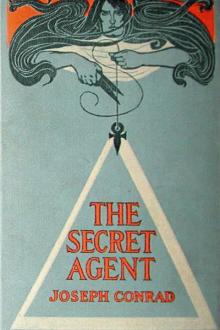The Secret Agent: A Simple Tale, Joseph Conrad [i can read book club .txt] 📗

- Author: Joseph Conrad
Book online «The Secret Agent: A Simple Tale, Joseph Conrad [i can read book club .txt] 📗». Author Joseph Conrad
On going out the Assistant Commissioner made to himself the observation that the patrons of the place had lost in the frequentation of fraudulent cookery all their national and private characteristics. And this was strange, since the Italian restaurant is such a peculiarly British institution. But these people were as denationalised as the dishes set before them with every circumstance of unstamped respectability. Neither was their personality stamped in any way, professionally, socially or racially. They seemed created for the Italian restaurant, unless the Italian restaurant had been perchance created for them. But that last hypothesis was unthinkable, since one could not place them anywhere outside those special establishments. One never met these enigmatical persons elsewhere. It was impossible to form a precise idea what occupations they followed by day and where they went to bed at night. And he himself had become unplaced. It would have been impossible for anybody to guess his occupation. As to going to bed, there was a doubt even in his own mind. Not indeed in regard to his domicile itself, but very much so in respect of the time when he would be able to return there. A pleasurable feeling of independence possessed him when he heard the glass doors swing to behind his back with a sort of imperfect baffled thud. He advanced at once into an immensity of greasy slime and damp plaster interspersed with lamps, and enveloped, oppressed, penetrated, choked, and suffocated by the blackness of a wet London night, which is composed of soot and drops of water.
Brett Street was not very far away. It branched off, narrow, from the side of an open triangular space surrounded by dark and mysterious houses, temples of petty commerce emptied of traders for the night. Only a fruiterer’s stall at the corner made a violent blaze of light and colour. Beyond all was black, and the few people passing in that direction vanished at one stride beyond the glowing heaps of oranges and lemons. No footsteps echoed. They would never be heard of again. The adventurous head of the Special Crimes Department watched these disappearances from a distance with an interested eye. He felt light-hearted, as though he had been ambushed all alone in a jungle many thousands of miles away from departmental desks and official inkstands. This joyousness and dispersion of thought before a task of some importance seems to prove that this world of ours is not such a very serious affair after all. For the Assistant Commissioner was not constitutionally inclined to levity.
The policeman on the beat projected his sombre and moving form against the luminous glory of oranges and lemons, and entered Brett Street without haste. The Assistant Commissioner, as though he were a member of the criminal classes, lingered out of sight, awaiting his return. But this constable seemed to be lost for ever to the force. He never returned: must have gone out at the other end of Brett Street.
The Assistant Commissioner, reaching this conclusion, entered the street in his turn, and came upon a large van arrested in front of the dimly lit window-panes of a carter’s eating-house. The man was refreshing himself inside, and the horses, their big heads lowered to the ground, fed out of nose-bags steadily. Farther on, on the opposite side of the street, another suspect patch of dim light issued from Mr Verloc’s shop front, hung with papers, heaving with vague piles of cardboard boxes and the shapes of books. The Assistant Commissioner stood observing it across the roadway. There could be no mistake. By the side of the front window, encumbered by the shadows of nondescript things, the door, standing ajar, let escape on the pavement a narrow, clear streak of gas-light within.
Behind the Assistant Commissioner the van and horses, merged into one mass, seemed something alive—a square-backed black monster blocking half the street, with sudden iron-shod stampings, fierce jingles, and heavy, blowing sighs. The harshly festive, ill-omened glare of a large and prosperous public-house faced the other end of Brett Street across a wide road. This barrier of blazing lights, opposing the shadows gathered about the humble abode of Mr Verloc’s domestic happiness, seemed to drive the obscurity of the street back upon itself, make it more sullen, brooding, and sinister.
CHAPTER VIIIHaving infused by persistent importunities some sort of heat into the chilly interest of several licensed victuallers (the acquaintances once upon a time of her late unlucky husband), Mrs Verloc’s mother had at last secured her admission to certain almshouses founded by a wealthy innkeeper for the destitute widows of the trade.
This end, conceived in the astuteness of her uneasy heart, the old woman had pursued with secrecy and determination. That was the time when her daughter Winnie could not help passing a remark to Mr Verloc that “mother has been spending half-crowns and five shillings almost every day this last week in cab fares.” But the remark was not made grudgingly. Winnie respected her mother’s infirmities. She was only a little surprised at this sudden mania for locomotion. Mr Verloc, who was sufficiently magnificent in his way, had grunted the remark impatiently aside as interfering with his meditations. These were frequent, deep, and prolonged; they bore upon a matter more important than five shillings. Distinctly more important, and beyond all comparison more difficult to consider in all its aspects with philosophical serenity.
Her object attained in astute secrecy, the heroic old woman had made a clean breast of it to Mrs Verloc. Her soul was triumphant and her heart tremulous. Inwardly she quaked, because she dreaded and admired the calm, self-contained character of her daughter Winnie, whose displeasure was made redoubtable by a diversity of dreadful silences. But she did not allow her inward apprehensions to rob her of the advantage of venerable placidity conferred upon her outward person by her triple chin, the floating ampleness of her ancient form, and the impotent condition of her legs.
The shock of the information was so unexpected that Mrs Verloc, against her usual practice when addressed, interrupted the domestic occupation she was engaged upon. It was the dusting of the furniture in the parlour behind the shop. She turned her head towards her mother.
“Whatever did you want to do that for?” she exclaimed, in scandalised astonishment.
The shock must have been severe to make her depart from that distant and uninquiring acceptance of facts which was her force and her safeguard in life.
“Weren’t you made comfortable enough here?”
She had lapsed into these inquiries, but next moment she saved the consistency of her conduct by resuming her dusting, while the old woman sat scared and dumb under her dingy white cap and lustreless dark wig.
Winnie finished the chair, and ran the duster along the mahogany at the back of the horse-hair sofa on which Mr Verloc loved to take his ease in hat and overcoat. She was intent on her work, but presently she permitted herself another question.
“How in the world did you manage it, mother?”
As not affecting the inwardness of things, which it was Mrs Verloc’s principle to ignore, this curiosity was excusable. It bore merely on the methods. The old woman welcomed it eagerly as bringing forward something that could be talked about with much sincerity.
She favoured her daughter by an exhaustive answer, full of names and enriched by side comments upon the ravages of time as observed in the alteration of human countenances. The names were principally the names of licensed victuallers—“poor daddy’s friends, my dear.” She enlarged with special appreciation on the kindness and condescension of a large brewer, a Baronet and an M. P., the Chairman of the Governors of the Charity. She expressed herself thus warmly because she had been allowed to interview by appointment his Private Secretary—“a very polite gentleman, all in black, with a gentle, sad voice, but so very, very thin and quiet. He was like a shadow, my dear.”
Winnie, prolonging her dusting operations till the tale was told to the end, walked out of the parlour into the kitchen (down two steps) in her usual manner, without the slightest comment.
Shedding a few tears in sign of rejoicing at her daughter’s mansuetude in this terrible affair, Mrs Verloc’s mother gave play to her astuteness in the direction of her furniture, because it was her own; and sometimes she wished it hadn’t been. Heroism is all very well, but there are circumstances when the disposal of a few tables and chairs, brass bedsteads, and so on, may be big with remote and disastrous consequences. She required a few pieces herself, the Foundation which, after many importunities, had gathered her to its charitable breast, giving nothing but bare planks and cheaply papered bricks to the objects of its solicitude. The delicacy guiding her choice to the least valuable and most dilapidated articles passed unacknowledged, because Winnie’s philosophy consisted in not taking notice of the inside of facts; she assumed that mother took what suited her best. As to Mr Verloc, his intense meditation, like a sort of Chinese wall, isolated him completely from the phenomena of this world of vain effort and illusory appearances.
Her selection made, the disposal of the rest became a perplexing question in a particular way. She was leaving it in Brett Street, of course. But she had two children. Winnie was provided for by her sensible union with that excellent husband, Mr Verloc. Stevie was destitute—and a little peculiar. His position had to be considered before the claims of legal justice and even the promptings of partiality. The possession of the furniture would not be in any sense a provision. He ought to have it—the poor boy. But to give it to him would be like tampering with his position of complete dependence. It was a sort of claim which she feared to weaken. Moreover, the susceptibilities of Mr Verloc would perhaps not brook being beholden to his brother-in-law for the chairs he sat on. In a long experience of gentlemen lodgers, Mrs Verloc’s mother had acquired a dismal but resigned notion of the fantastic side of human nature. What if Mr Verloc suddenly took it into his head to tell Stevie to take his blessed sticks somewhere out of that? A division, on the other hand, however carefully made, might give some cause of offence to Winnie. No, Stevie must remain destitute and dependent. And at the moment of leaving Brett Street she had said to her daughter: “No use waiting till I am dead, is there? Everything I leave here is altogether your own now, my dear.”
Winnie, with her hat on, silent behind her mother’s back, went on arranging the collar of the old woman’s cloak. She got her hand-bag, an umbrella, with an impassive face. The time had come for the expenditure of the sum of three-and-sixpence on what might well be supposed the last cab drive of Mrs Verloc’s mother’s life. They went out at the shop door.
The conveyance awaiting them would have illustrated the proverb that “truth can be more cruel than caricature,” if such a proverb existed. Crawling behind an infirm horse, a metropolitan hackney carriage drew up on wobbly wheels and with a maimed driver on the box. This last peculiarity caused some embarrassment. Catching sight of a hooked iron contrivance protruding from the left sleeve of the man’s coat, Mrs Verloc’s mother lost suddenly the heroic courage of these days. She really couldn’t trust herself. “What do you think, Winnie?” She hung back. The passionate expostulations of the big-faced cabman seemed to be squeezed out of a blocked throat. Leaning over from his box, he whispered with mysterious indignation. What was the matter now? Was it possible to treat a man so? His enormous and unwashed countenance flamed red in the muddy stretch of the street. Was it likely they would have given him a licence, he inquired desperately, if—
The police constable of the locality quieted him by a friendly glance; then addressing himself to the two women without marked consideration, said:
“He’s been driving a cab for twenty years. I never knew him to have an accident.”
“Accident!” shouted the driver in a scornful whisper.
The policeman’s testimony settled it. The modest assemblage of seven people, mostly under age, dispersed. Winnie followed her mother into the cab. Stevie climbed on the box. His vacant mouth and distressed eyes depicted the state of his mind in regard to the transactions which were taking place. In the narrow streets the progress of the journey was made sensible to those within by the near fronts of the houses gliding past slowly and shakily, with a great rattle and jingling of glass, as if about to collapse behind the cab; and the infirm horse, with the harness hung over his sharp backbone flapping very loose about his thighs, appeared to be dancing mincingly on his toes with infinite patience. Later on, in the wider space of Whitehall, all visual evidences of motion became imperceptible. The rattle and jingle of glass went on indefinitely in front of the long Treasury building—and time itself seemed to stand still.
At last Winnie observed: “This isn’t a very





Comments (0)